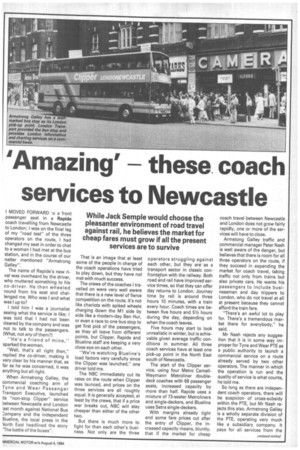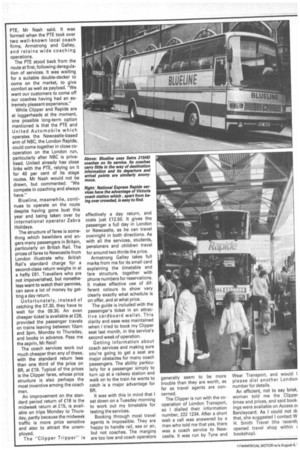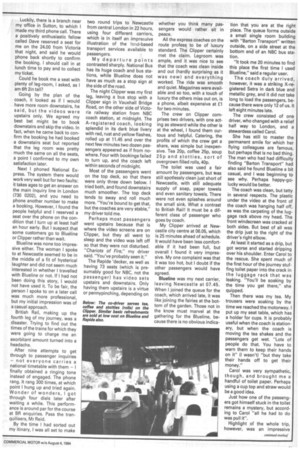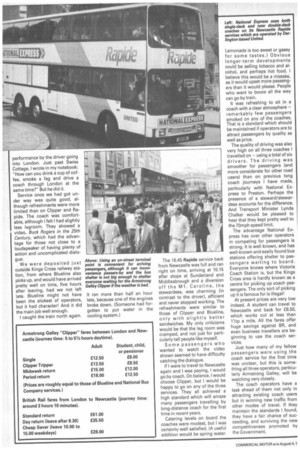'Amazing' these coach services to Newcastle
Page 51

Page 52

Page 53

Page 54

If you've noticed an error in this article please click here to report it so we can fix it.
While Jack Semple would choose the pleasanter environment of road travel against rail, he believes the market for cheap fares must grow if all the present services are to survive
I MOVED FORWARD 0 a front passenger seat in a Rapide coach travelling from Newcastle to London; I was on the final leg of my "road test" of the three operators on the route, I had changed my seat in order to chat to a woman I had met at the bus station, and in the course of our natter mentioned "Armstrong Galley", The name of Rapide's new rival was overheard by the driver, who muttered something to his co-driver. He then wheeled round from his seat and challenged me. Who was I and what was I up to?
I told him I was a journalist seeing what the service is like; I was told that I had not been cleared by the company and was not to talk to the passengers. (What, not any of them?) "He's a friend of mine,'" sparked the woman.
"Well, that's all right then," replied the co-driver, making it very clear by his manner that, as far as he was concerned, it was anything but all right.
When Armstrong Galley, the commercial coaching arm of Tyne and Wear Passenger Transport Executive, launched its "non-stop Clipper" service Detween Newcastle and London ast month against National Bus 1...'ompany and the independent 3lueline, the local press in the Jorth East headlined the story 'The battle of the buses".
That is an image that at least some of the people in charge of the coach operations have tried to play down, but they have not met with much success.
The crews of the coaches I travelled on were very well aware that there is a new level of fierce competition on the route. It's not like chariots with spiked wheels charging down the M1 side by side like a modern-day Ben Hur, or even a race to one bus stop to get first pick of the passengers, as they all leave from different points, but Clipper, Rapide and Blueline staff are keeping a very close eye on each other.
"We're watching Blueline's load factors very carefully since the Clipper was launched," one driver told me.
The NBC immediately cut its rates on the route when Clipper was launced, and prices on the three services are all roughly equal. It is generally accepted, at least by the crews, that if a price war breaks out, NBC will stay cheaper than either of the other two.
But there is much more to fight for than each other's business. Not only are the three
operators struggling against each other, but they are as a transport sector in classic confrontation with the railway. Both road and rail have improved service times, so that they can offer day returns to London. Journey time by rail is around three hours 10 minutes, with a train every hour. Coach times are between five hours and 51/2 hours during the day, depending on when the coach leaves.
Five hours may start to look unrealistic in winter, but is achievable given average traffic conditions in summer. All three coach services have at least one pick-up point in the North East south of Newcastle.
The start of the Clipper service, using four Metro CamellWeymann Metroliner doubledeck coaches with 69 passenger seats, increased capacity by more than half. Rapide uses a mixture of 73-seater Metroliners and single-deckers, and Blueline uses Setra single-deckers, With margins already tight and some fare prices cut after the entry of Clipper, the increased capacity means, bluntly, that if the market for cheap coach travel between Newcastle and London does not grow fairly rapidly, one or more of the services will have to close.
Armstong Galley traffic and commercial manager Peter Nash is well aware of the danger, but believes that there is room for all three operators on the route, if they succeed in expanding the market for coach travel, taking traffic not only from trains but also private cars. He wants his passengers to include businessmen and day trippers to London, who do not travel at all at present because they cannot afford the train fare.
"There's an awful lot to play for. There's a tremendous market there for everybody," he said.
Mr Nash rejects any suggestion that it is in some way improper for Tyne and Wear PTE as a public authority to launch a commercial service on a route already served by two other operators. The manner in which the operation is run and the quality of service is what counts, he told me.
So long as there are independent coach operators, there will be suspicion of cross-subsidy within the PTE, but Mr Nash rejects this also. Armstrong Galley is a wholly separate division of the PTE, operating very much like a subsidiary company. It pays for all services from the PTE, Mr Nash said. It was formed when the PTE took over two well-known local coach firms, Armstrong and Galley, and retains wide coaching operations.
The PTE stood back from the route at first, following deregula tion of services. It was waiting for a suitable double-decker to come on the market, to give comfort as well as payload. "We want our customers to come off our coaches having had an extremely pleasant experience."
While Clipper and Rapide are at loggerheads at the moment, one possible long-term option mentioned is that the PTE and United Automobile which operates the Newcastle-based arm of NBC, the London Rapide, could come together in close cooperation on the London run, particularly after NBC is privatised. United already has close links with the PTE, relying on it for 40 per cent of its stage routes. Mr Nash would not be drawn, but commented: "We compete in coaching and always have."
Blueline, meanwhile, continues to operate on the route despite having gone bust this year and being taken over by international operator Zebra Holidays.
The structure of fares is something which bewilders and angers many passengers in Britain, particularly on British Rail. The prices of fares to Newcastle from London illustrate why. British Rail's standard charge for a second-class return weighs in at a hefty £61. Travellers who are not impoverished, but nonetheless want to watch their pennies, can save a lot of money by getting a day return.
Unfortunately, instead of catching the 07.30, they have to wait for the 09.30. An even cheaper ticket is available at £28, provided the passenger travels on trains leaving between 10am and 3pm, Monday to Thursday, and books in advance. Pass me the asprin, Mr Reid!
The coach services work out much cheaper than any of these, with the standard return less than one third of the price on BR, at £18. Typical of the prices is the Clipper fares, whose price structure is also perhaps the most inventive among the coach men.
An improvement on the standard period return of £18 is the midweek return at £15, is available on trips Monday to Thursday, partly because the midweek traffic is more price sensitive and also to attract the unemployed.
The "Clipper Tripper" is effectively a day return, and costs just £12.50. It gives the passenger a full day in London or Newcastle, as he can travel overnight in both directions. As with all the services, students, pensioners and children travel for around two thirds the price.
Armstrong Galley takes full marks from me for its small card explaining the timetable and fare structure, together with phone numbers for reservations. It makes effective use of different colours to show very clearly exactly what schedule is on offer, and at what price.
The guide is included with the passenger's ticket in an attractive cardboard wallet. This clarity and ease was maintained when I tried to book my Clipper seat last month, in the service's second week of operation.
Getting information about coach services and making sure you're going to get a seat are major obstacles for many coach passengers. The ability particularly for a passenger simply to turn up at a railway station and walk on to the train he wants to catch is a major advantage for BR.
It was with this in mind that I sat down on a Tuesday morning to work out my timetable for testing the services.
Booking through most travel agents is impossible. They are happy to handle rail, sea or air, but not coaches. The margins are too low and coach operators generally seem to be more trouble than they are worth, as far as travel agents are concerned.
The Clipper is run with the cooperation of London Transport, so I dialled their information number, 222 1234. After a short wait a call was answered by a man who told me that yes, there was a coach service to Newcastle. It was run by Tyne and Wear Transport, and would I please dial another London number for details.
An efficient, not to say brisk, woman told me the Clipper times and prices, and said bookings were available on Access oi Barclaycard. As I could not dc that, she suggested I contact W H. Smith Travel (the recent]) opened travel shop within bookshop). Luckily, there is a branch near my office in Sutton, to which I made my third phone call. There a positively enthusiastic fellow called Dave reserved a seat for me on the 24.00 from Victoria that night, and said he would phone back shortly to confirm the booking. I should call in at lunch time to pay and to collect my ticket.
Could he book me a seat with plenty of leg-room, I asked, as I am 6ft 2in tall?
Going by the plan of the coach, it looked as if I would have more room downstairs, he said, but the videos were upstairs only. We agreed my best bet might be to book downstairs and skip the video. In fact, when he came back to confirm the booking he had booked a downstairs seat but reported that the leg room was pretty much the same on all the seats, a point I confirmed to my own satisfaction later.
Next I phoned National Express. The system there would work very well but for two faults: it takes ages to get an answer on the main inquiry line in London (730 0202), and you need to phone another number to make a booking. However, I found the people helpful and I reserved a seat over the phone on the condition that I turn up at least half an hour early. But I suspect that some customers go to Blueline or Clipper rather than wait.
Blueline was none too impressive either. The woman I spoke to at Newcastle seemed to be in the middle of a fit of hysterical laughter and did not seem much interested in whether 1 travelled with Blueline or not. If I had not been doing this story, I would not have used it. To be fair, the person I spoke to on a later call was much more professional, but my initial impression was of a casual approach.
British Rail, making up the fourth leg of my journey, was a disaster. Trying to find out the times of the trains for which they were going to charge me an exorbitant amount turned into a headache.
After nine attempts to get through to passenger inquiries — not everyone carries a national timetable with them — I finally obtained a ringing tone instead of engaged. The phone rang. It rang 300 times, at which point I hung up and tried again. Wonder of wonders, I got through four dials later after waiting a while. This performance is around par for the course at BR enquiries. Pass the tranquilisers, Mr Reid.
By the time I had sorted out my itinary. I was all set to make two round trips to Newcastle from central London in 22 hours, using four different carriers, which is in itself an impre.sive illustration of the hid-based transport services available to passengers.
My departure points contrasted sharply. National Bus has its huge coach and bus stations, while Blueline does not have as much as a stop sign at the side of the road.
The night Clipper was my first leg, leaving a bus stop with a Clipper sign in Vauxhall Bridge Road, on the other side of Victoria railway station from NBC coach station, at midnight. The A-registered coach, looking splendid in its dark blue livery with red, rust and yellow flashes, rolled up at 11.45 and over the next few minutes two dozen passengers appeared as if from nowhere. Four with bookings failed to turn up, and the coach left within seconds of midnight.
Most of the passengers went on the top deck, so that there were only three down below. I tried both, and found downstairs much smoother. The top deck tends to sway and roll much more. "You're bound to get that, but the coaches are very stable," my driver told me.
Perhaps most passengers went upstairs because that is where the video screens are on Clipper, but they all went to sleep and the video was left off so that they were not disturbed. "Chariots of Fire," my driver said. "You've probably seen it."
The Rapide 'decker, as well as having 73 seats (which is presumably good for NBC, not the passenger) has video sets upstairs and downstairs. Only having them upstairs is a virtue or pennypinching, depending on whether you think many passengers would rather sit in peace.
All the express coaches on the route profess to be of luxury standard. The Clipper certainly met the claim. Legroom was ample, and it was nice to see that the coach was clean inside and out (hardly surprising as it was new) and everything worked. The ride was smooth and quiet. Magazines were available and so too, with a touch of luxury the others miss out on, is a phone, albeit expensive at £1 for two minutes.
The crew on Clipper comprises two drivers, with one acting as steward while the other is at the wheel, I found them curtous and helpful. Catering, the profits of which the crew get a share, was simple but inexpensive. Tea 20p, coffee 25p, soup 25p and stotties, sort of overgrown filled rolls, 40p.
The toilet was used a fair amount by passengers, but was still spotlessly clean just short of Newcastle, with still adequate supply of soap, paper towels and even sanitary towels. There were not even splashes around the small sink. What a contrast to British Rail! It must be a different class of passenger who goes by coach.
My Clipper arrived at Newcastle city centre at 06.05, which is 25 minutes ahead of schedule. It would have been less comfortable if it had been full, but overall I found it very impressive. My one complaint was that it was too hot, but I doubt if the other passengers would have agreed.
Blueline was my next carrier, leaving Newcastle at 07.45. When I joined the queue for the coach, which arrived late, it was like joining the fairies at the bottom of the garden. Those not in the know must marvel at the gathering for the Blueline, because there is no obvious indica tion that you are at the right place. The queue forms outside a small single room building with "Barton Transport" written outside, on a side street at the bottom end of an NBC bus station.
"It took me 20 minutes to find this place the first time I used Blueline," said a regular user.
The coach duly arrived, however, it was a striking X-registered Setra in dark blue and metallic grey, and it did not take long to load the passengers, because there were only 12 of us. It left eight minutes late.
The crew consisted of one driver, who changed with a relief half way to London, and a stewardess called Carol.
She has still to master the permanent smile for which her flying colleagues are famous, but perhaps that is no bad thing. The man who had had difficulty finding "Barton Transport" had also said he found Blueline a bit casual, and I was beginning to see why. Perhaps happy-golucky would be better.
The coach was clean, but tatty in several respects. The plastic under the video at the front of the coach was hanging half off, as was the carpeting of the luggage rack above my head. The front windscreen was cracked at both sides. But best of all was the drip just to the right of the driver's right elbow.
At least it started as a drip, but got worse and started dripping over his shoulder. Enter Carol to the rescue. She spent much of the first hour of the journey stuffing toilet paper into the crack in the luggage rack that was leaking. "You'll be soaking by the time you get there," she quipped.
Then there was my tea. My trousers were soaking by the time we reached the motorway. I put up my seat table, which has a holder for cups. It is probably useful when the coach is stationary, but when the coach is moving the tea shakes and the passengers get wet. "Lots of people do that. You have to warn them to keep their hands on it" (I wasn't) "but they take their hands off to get their money."
Carol was very sympathetic, though, and brought me a handful of toilet paper. Perhaps using a cup top and straw would be a good idea.
Just how one of the passengers got himself stuck in the toilet remains a mystery, but according to Carol "all he had to do was pull it".
Highlight of the whole trip, however, was an impressive performance by the driver going into London. Just past Swiss Cottage, I wrote in my notebook: "How can you drink a cup of coffee, smoke a fag and drive a coach through London at the same time?" But he did it.
Service once we had got under way was quite good, although refreshments were more limited than on Clipper and Rapide. The coach was comfortable, although I felt I had slightly less legroom. They showed a video, Buck Rogers in the 25th Century, which had the advantage for those not close to a loudspeaker of having plenty of action and uncomplicated dialogue.
We were deposited just outside Kings Cross railway station, from where Blueline also picks up, and would have arrived pretty well on time, five hours after leaving, had we not left late. Blueline might not have been the slickest of operators, but it had character! And it did the main job well enough.
I caught the train north again. It ran more than half an hour late, because one of the engines broke down. (Someone had forgotten to put water in the cooling system.)
The 16.45 Rapide service back from Newcastle was full and ran right on time, arriving at 10.15 after stops at Sunderland and Middlesbrough and a diversion off the Ml. Caroline, the stewardess, was charming (in contrast to the driver), efficient and never stopped working. The refreshments were similar to those of Clipper and Blueline, only with slightly better sandwiches. My only criticisms would be that the leg room was cramped, and not just for particularly tall people like myself.
Some passengers who wanted to watch the video shown seemed to have difficulty catching the dialogue.
If I were to travel to Newcastle again and I was paying, I would go by coach. On balance, I would choose Clipper, but I would be happy to go on any of the three services. They all achieved a high standard which will amaze many passengers travelling by long-distance coach for the first time in recent years.
Catering levels on board the coaches were modest, but I was certainly well satisfied. (A useful addition would be spring water. Lemonade is too sweet or gassy for some tastes.) Obvious longer-term developments could be selling tobacco and alcohol, and perhaps hot food. I believe this would be a mistake, as it would upset more passengers than it would please. People who want to booze all the way can go by train.
It was refreshing to sit in a coach with a clear atmosphere — remarkably few passengers smoked on any of the coaches. That is a standard which should be maintained if operators are to attract passengers by quality as well as price.
The quality of driving was also very high on all three coaches I travelled on — using a total of six drivers. The driving was smoother for passengers (and more considerate for other road users) than on previous long coach journeys I have made, particularly with National Express to Preston. Perhaps the presence of a steward/stewardess accounts for the difference. And Transport Minister Lynda Chalker would be pleased to hear that they kept pretty well to the 70mph speed limit.
The advantage National Express has over other operators in competing for passengers is strong. It is well known, and has well-known and easily found bus stations offering shelter to passengers waiting to board. Everyone knows where Victoria Coach Station is, but the Kings Cross area is hardly known as a centre for picking up coach passengers. The only sort of picking up it is famous for is illegal!
At present prices are very low indeed. A student can travel to Newcastle and back for £8.50, which works out at less than 11/2p a mile. All the fares offer huge savings against BR, and even business travellers are beginning to use the coach services.
Just how many of my fellow passengers were using the coach service for the first time was unclear, but this is something all three operators, particularly Armstrong Galley, will be watching very closely.
The coach operators have a task ahead of them not only in attracting existing coach users but in winning new traffic from other modes of travel. If they maintain the standards I found, they have a fair chance of succeeding, and surviving the new competitiveness promoted by the Government.
























































































